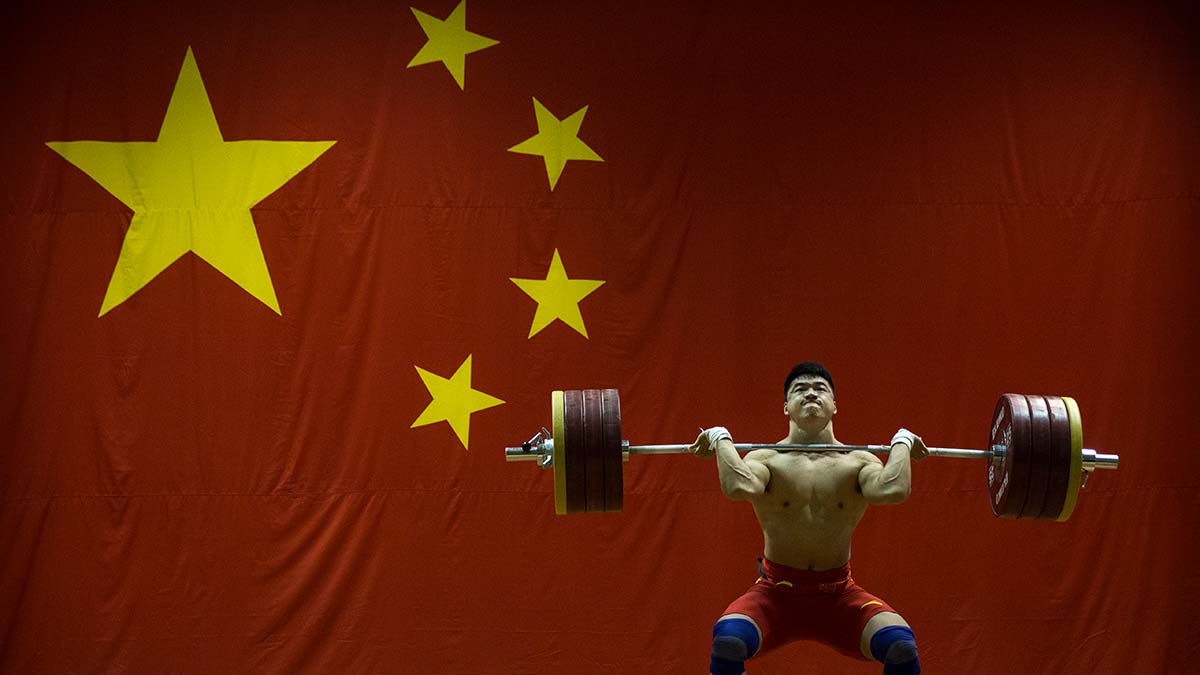There are signs China is getting back to work — here are 5 small caps which stand to benefit

(Getty Images)
The coronavirus pandemic currently wreaking havoc on major western economies now looks set to continue escalating well into April.
But for the country at the original epicentre of the outbreak, China, some analysts have pointed to evidence that economic activity is getting back on track now the worst of the crisis has been contained.
On a timeline perspective, China first enforced strict isolation measures in mid-January, which puts it around two months ahead of most other countries.
And if the world’s second largest economy does bounce back, it will be good news for the ASX small caps that have exposure to Chinese growth.
To learn more about conditions on the ground, Stockhead spoke to senior staff from companies across five different sectors; medtech, envirotech, mining, health & wellness and infant formula.
Among the tentative signs of growth, official government data this week showed China’s manufacturing PMIs rose back to 52 in March, after slumping to a low of 35.7 in February.
But as one CEO told us, “you’re always double guessing any official numbers that come out of China”. However, non-government (Caixin) PMI data out of China this week also came in with a reading of 50.1 (any measure above 50 signals expansion), beating analyst forecasts of around 45.
In that context, the conversations we had with various company leaders provided some interesting insights about the Chinese outlook. Here’s what they had to say.
Fenix Resources (ASX:FEX)
As one of the few listed ASX small caps with an iron ore focus, Fenix’s sales pipeline is closely intertwined with developments in the Chinese economy.
Speaking with Stockhead, CEO Rob Brierley said he hadn’t seen any evidence the impact of COVID-19 had flowed through to iron ore shipments.
“In the March quarter you’ve got Chinese New Year which often slows demand, and with the impact of corona normally you’d expect demand to be quite weak but it hasn’t really played out like that,” he said.
Instead, the data shows iron ore stockpiles at Chinese ports have actually reduced a little bit.
“I’ve been surprised stockpiles haven’t grown in that environment, but I think it shows China’s back in some ways and their steel mills never seemed to miss a beat.”
Back in Australia, Brierley said the sharp moves in markets as a result of the crisis had also created some positives for Fenix. As an exporter it will benefit from the lower Aussie dollar, as well as falls in the cost of diesel fuel as oil prices plummet.
“Our business is built on low capex, using a contracting model and existing infrastructure,” Brierley explained. “So our capital outlay to get into production is around $12m, which is incredibly low, but the trade-off is our operating costs are higher.
“The fall in diesel prices gives us an operating cost benefit on the ground, and it’s also impacted sea freight charges which have halved in the last month or so.”
Looking ahead, Brierley said he expected the ongoing rebalancing in iron ore markets would see prices for higher grade fines supported above $US80 ($132) per tonne.
“The disaster in Brazil last year created a shortage of iron ore across the board, so it created sort of a mad scramble no matter what the grade,” he said.
“We think as the market returns to balance, Chinese customers will become more discerning on quality.”
Fenix is in the final stages of the permit approval process for its high-grade Iron Ridge project in the Pilbara, and expects to proceed with production and shipments “by the end of the year”, Brierley said.
Eve Investments (ASX:EVE)
The health & wellness company manufactures a number of organic products led by its Meluka raw honey range, with distribution channels into the US and China.
Stockhead caught up with managing director Bill Fry this week, who said the company has noticed some interesting demand trends in the wake of the COVID-19 outbreak.
In a similar way to Fenix, Fry said it had more or less been “business as usual” for EVE in the early part of the year, despite the dramatic slump in global economic activity.
“We got our first large order out of China in December, which we manufactured and shipped,” Fry said. “There was some initial uncertainty, but the stock arrived in Shanghai and was cleared pretty readily.
“Any delay was probably from our end, but by the time we got confirmation with shipping agents in Q1 they confirmed there was no issue.”
Fry said the company got another order out of China in March which it’s about to start manufacturing for. But he also highlighted some good progress in the US market, which is now the epicentre of the pandemic.
“We had some concerns that the US logistics networks might slow, but today we’re not noticing it,” Fry said. Rather, the company’s positioning as a premium food producer may be contributing to a competitive advantage in the current climate.
“We’re certainly seeing that our US numbers have grown significantly through this period. We’re trying to ascertain how much is related to the virus, and how much is normal business growth,” Fry said.
“It’s hard to tell but our month-on-month sales have increased well beyond what we budgeted for.”
As a result, Eve is ramping up production quicker than expected in order to get product onto the US supply chain for Amazon, its primary distribution partner.
“To get that inventory into their system quickly enough we’re having to air freight to meet demand,” Fry said. “We just sent three air shipments to the US last week. They’ve all cleared customs and are on their way to the warehouse.
“Right now our priority is the US and then China will follow after that. But from our point of view we’re satisfied our logistics chain is working as per normal.”
Nuchev (ASX:NUC)
Nuchev made a solid start to listed life when it joined the ASX boards in December after raising $48.6m. But like many small caps, the company hasn’t been immune to the COVID-19 selloff that commenced in late-February.
Nuchev’s product line includes an infant formula range, but with a twist – its Oli6 brand is derived from goat’s milk, instead of cow’s milk.
Similarly to other competitors in the space it has a strong China focus, which it targets via direct sales and Australian distribution channels.
While some indications suggest China has made strides in containing the epidemic, Nuchev CEO Ben Dingle told Stockhead the feedback suggested strict policy measures were still in place.
“What we hear from our staff on the ground is that they really appear to have their foot down on control measures. Lots of testing going on, lots of controls and tracking. So if there is a secondary outbreak they’ll be well placed to shut it down pretty fast,” he said.
In terms of household shopping lists, Dingle said infant formula’s status as a necessity item does help to hold it in good stead compared to discretionary purchases.
“Our target consumers are chinese mothers and they’re a pretty savvy consumer set, particularly with toddlers they’re looking after,” said Dingle, who’s also Nuchev’s major shareholder with a 46 per cent stake.
“So we’ve signalled that we do see promising signs in terms of e-commerce. But at this stage it’s a bit early to say whether that will have a major material impact on our performance.”
Nuchev recently reaffirmed its full-year revenue guidance, but flagged some uncertainty around underlying earnings due to the market volatility.
Osteopore (ASX:OSX)
After surging more than 300 per cent on its ASX debut in September, Osteopore shares have dropped back amid the COVID-19 selloff, but the stock is still trading at around double its listing price.
Investors are still optimistic about the commercial application of the company’s bone regeneration technology, which uses a 3D bio-printer that makes a scaffold which mimics bone using the patient’s own stem cells.
Osteopore began sizing up the Chinese market late last year, when it signed a memorandum of understanding to distribute its product into the southern province of Hainan.
Speaking with Stockhead, executive director Geoff Pocock said the company had seen a change, but it wouldn’t materially affect business operations.
“The key from an investor perspective is to understand what’s the actual business relationship?”, Pocock says.
“From a supply chain standpoint that can be hard. If it cuts into existing sales that can have an impact. But the good thing for us is that from a supply chain perspective, we don’t have a lot of exposure. We’re still in the early stages in terms of making that capital outlay.
“[The pandemic] isn’t going to shut anything off, but it will just make things slower. Like most countries, doing deals in China is very relationship based. So where it might have taken a couple of months, it will take longer now because it’s harder to get those sorts of relationships in place.”
Pocock said that while the company’s target market of Hainan was hit as hard by COVID-19 as other regions, the change of pace was still evident.
“We’re getting anecdotal evidence people (in China) are back at work and starting to do things. But they’re also only just starting to clear backlogs — transaction opportunities, sales agreements and things like that,” he said.
“But the key thing is we haven’t lost sales, it’s just a process of getting approvals and getting into market. That’s starting to happen but it’s slower than what it would’ve been when we launched those plans late last year.”
Phoslock Environmental Technologies (ASX:PET)
The wastewater treatment company has a strong focus on the Chinese market, where it booked 85 per cent of its total sales for the financial year ended December 31.
Phoslock serves a number of jurisdictions in China where its technology is deployed in lakes and waterways to “bind” dissolved phosphorous to effectively cut off the food source for algae growth.
At slightly above 50c, shares in the company are well off the highs of almost $1.60 reached in the middle of last year. But it’s held up comparatiely well since the COVID-19 crisis crushed stock prices across the board in early March.
A market update on Thursday March 26 saw Phoslock shares bounce off recent lows, as the company provided further details about its Chinese operations.
With China around two months ahead of major western economies in its containment efforts, Phoslock said its Changxing factory first reopened on February 17, and by March 2 was running two extended shifts to increase production.
By March 25, the factory produced “60 tons of Phoslock, a new record for daily production,” Phoslock said.
The company’s Beijing office reopened on February 10, while Phoslock shipments started back up on February 20 and “the transportation system is largely back to normal”, it said.
Phoslock also maintained its FY20 revenue guidance of between $50m and $70m. “In light of measures to limit the spread of coronavirus, PET will continue to review its forecast, and amend if business conditions change,” the company said.
Stockhead contacted Phoslock for further comment about conditions on the ground in China
At Stockhead, we tell it like it is. While Eve Investments and Osteopore are Stockhead advertisers, they did not sponsor this article.
Related Topics
UNLOCK INSIGHTS
Discover the untold stories of emerging ASX stocks.
Daily news and expert analysis, it's free to subscribe.
By proceeding, you confirm you understand that we handle personal information in accordance with our Privacy Policy.








